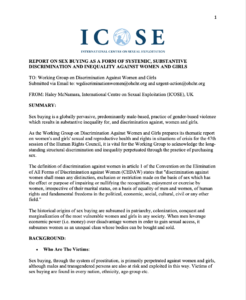In August 2020, the International Centre on Sexual Exploitation (ICOSE) sent a report to the Working Group on Discrimination Against Women and Girls at the United Nations in response to their call for submissions. The Working Group is currently preparing a thematic report on women’s and girls’ sexual and reproductive health and rights in situations of crisis for the 47th session of the Human Rights Council.
The International Centre on Sexual Exploitation (the international division of the US-based NCOSE) believes it is vital for the Working Group to recognize that sex buying is a practice of gender-based violence, discrimination, and substantive inequality for women and girls around the globe.
While many groups have recently lobbied the United Nations to promote prostitution as a legitimate job, ICOSE and other human rights groups are working to educate the UN on the inherent harms of the sex trade.
The practice of sex buying preys on the most vulnerable and marginalized in society. As the report states:
Poverty is also a major driver of women and girls into prostitution. In South Korea, interviews found that 78.3% of prostituted persons experienced serious economic crisis including homelessness.[1] And a study conducted in nine different countries found that 75% of women in prostitution had experiences homelessness.[2]
Sex buying, then, works as a coercive system to provide socio-economically advantaged men with sexual access to the most vulnerable populations and castes. Victims of sex buying are primarily women and girls who experience intersectional discrimination through racism, prior sexual abuse, colonialism, poverty, lack of opportunity/education, and more. Sex buying preys on these populations.
Further, the report notes that sex buyers are the primary cause of sexual violence in the sex trade. It states: “Among First Nation women in prostitution in Canada, 90% were physically assaulted and 82% of assaults were perpetrated by sex buyers.[3] And a study of 220 women in prostitution in Chicago found that sex buyers were responsible for 62-100% of violence against women in street-based prostitution.[4]
It is vital for the United Nations, and all governing bodies, to recognize that prostitution is not a job. Prostitution is a system of sexual exploitation that causes physical and psychological trauma that cannot be regulated away.
Click here to download the full report.
[1] 5 Choi, H., Klein, C., Shin, M. & Lee, H. (2009, August). Posttraumatic stress disorder (PTSD) and disorders of extreme stress (DESNOS) symptoms following prostitution and childhood abuse. (2009). Violence Against Women, 15(8), 933-951.
[2] Farley, M., Cotton, A., Lynne, J., Zumbeck, S., Spiwak, F., Reyes, M. E., Sezgin, U. (2003). Prostitution and trafficking in 9 countries: Update on violence and posttraumatic stress disorder. In M. Farley (Ed.), Prostitution, trafficking and traumatic stress (pp. 33–74). New York: Routledge
[3] Farley, M., Lynne, J. and Cotton, A. (2005). Prostitution in Vancouver: Violence and the colonization of First Nations women. Transcultural Psychiatry, 42(2), 242-271.
[4] Raphael, J. and Shapiro, D. (2002, August). Sisters speak out: The lives and needs of prostituted women in Chicago. Center for Impact Research, 1-35.



